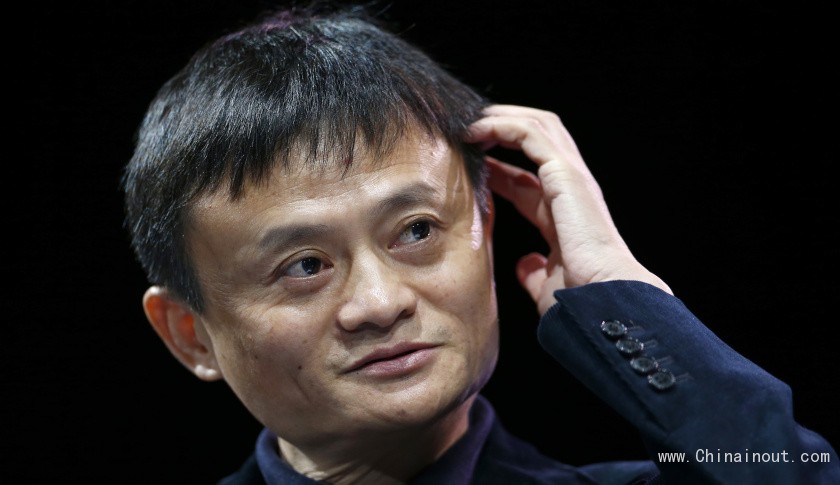上周,馬云提出要讓支付寶(Alipay)和蘋果支付(Apple Pay)在中國(guó)合作,,不過(guò)當(dāng)時(shí)他的這個(gè)提議顯得并不合理,。
支付寶是中國(guó)當(dāng)下最熱門的在線支付系統(tǒng),人們用它支付淘寶(Taobao)上的訂單,,繳納物業(yè)費(fèi),,購(gòu)買電影票,還可在其他購(gòu)物網(wǎng)站上消費(fèi),。然而,,支付寶的地位與擁有數(shù)萬(wàn)個(gè)商家和刷卡網(wǎng)絡(luò)的Visa、萬(wàn)事達(dá)(Mastercard)或中國(guó)銀聯(lián)(unioPay)不盡相同,。漫步在北京或者上海的街頭,,你會(huì)發(fā)現(xiàn)銀聯(lián)的標(biāo)志隨處可見(jiàn)——作為國(guó)有支付處理機(jī)構(gòu),銀聯(lián)在中國(guó)具有壟斷地位——而支付寶的標(biāo)志卻寥寥無(wú)幾,。與此同時(shí),,蘋果(Apple)的新產(chǎn)品——蘋果支付——更多的是一種實(shí)地體驗(yàn)。你無(wú)需在結(jié)賬柜臺(tái)刷卡,,而只需在與蘋果簽約的20萬(wàn)家門店內(nèi),,輕松按下iPhone的home鍵就能完成付款。是的,,蘋果手機(jī)上的在線組件讓在線購(gòu)物變得更方便了,,但它的關(guān)鍵還是物理組件,而支付寶的特色則是在線支付,。
所以當(dāng)馬云拋出橄欖枝時(shí),,我們并不清楚支付寶在中國(guó)能給蘋果帶來(lái)什么:它在國(guó)內(nèi)沒(méi)有支付設(shè)施,盡管曾經(jīng)有過(guò)——支付寶曾在一些商家的收銀臺(tái)前提供二維碼,顧客可以掃描二維碼來(lái)付款,,而銀聯(lián)隨后表示,,支付寶必須通過(guò)銀聯(lián)網(wǎng)絡(luò)才能完成支付處理。
但馬云并不是輕率地開腔,,這番話極有分量,,即便你很難理解。就在馬云在眾目睽睽下與蒂姆o庫(kù)克的對(duì)話剛過(guò)去兩天,,中國(guó)政府就宣布了將對(duì)支付政策做出巨大改變,,馬云的合作設(shè)想隨之得到有利支持。
上周三,,由李克強(qiáng)總理領(lǐng)導(dǎo)的中國(guó)國(guó)務(wù)院宣布,,中國(guó)將對(duì)Visa、萬(wàn)事達(dá)和美國(guó)運(yùn)通(American Express)等國(guó)外公司開放支付系統(tǒng),。一直處于弱勢(shì)地位的支付寶也有可能位列其中,。十多年來(lái),中國(guó)一直禁止這些公司發(fā)放自己的銀行卡,,強(qiáng)迫他們使用銀聯(lián)網(wǎng)絡(luò)并繳納費(fèi)用,。在此期間,銀聯(lián)成長(zhǎng)為一家羽翼豐滿的壟斷巨頭,。
支付寶在面對(duì)銀聯(lián)時(shí)遭遇了類似困境,。去年8月,在銀聯(lián)表示支付寶的交易必須納入銀聯(lián)網(wǎng)絡(luò)后,,支付寶突然宣布,,由于“明顯的原因”,將關(guān)閉線下銷售點(diǎn)的服務(wù)——盡管數(shù)量非常有限,。
中國(guó)商業(yè)媒體財(cái)新(Caixin)當(dāng)時(shí)引用了一個(gè)消息源的說(shuō)法:“支付寶決定徹底退出線下支付領(lǐng)域,,因?yàn)樗幌胧艿姐y聯(lián)的控制。”
在在線支付領(lǐng)域,,馬云并沒(méi)有受到銀聯(lián)的管控,,因?yàn)檫@塊蛋糕太大了。研究公司iResearch的數(shù)據(jù)顯示,,去年中國(guó)在線支付的總額達(dá)到9,000億美元,,其中幾乎一半都是通過(guò)支付寶完成的。
馬云著名之處,,在于他總能快政府一到兩步,,卻不會(huì)越線。其中一個(gè)例子是他在2004年創(chuàng)立了支付寶在線支付系統(tǒng),,并與200家銀行簽約,,一舉打破了銀聯(lián)的壟斷,。與蘋果支付的合作似乎會(huì)是另一個(gè)成功案例。這次合作起初意義不大,,但隨著中國(guó)政府宣布將放開支付領(lǐng)域的限制,,因而減少了銀聯(lián)對(duì)市場(chǎng)和支付寶的影響力,情況就大不同了,。這一規(guī)定究竟將如何實(shí)施仍有待觀察,,但一夜之間,銀聯(lián)對(duì)支付寶的影響大大減少了,。
馬云似乎在官方發(fā)布消息之前就已經(jīng)知道政策即將變化,,因此才提出了和蘋果支付合作的建議。阿里巴巴(Alibaba)的發(fā)言人拒絕對(duì)此發(fā)表評(píng)論,。
即便中國(guó)政府有意讓外國(guó)銀行卡公司甚至支付寶都進(jìn)入市場(chǎng),,但它們要成長(zhǎng)到足以同銀聯(lián)競(jìng)爭(zhēng)仍需要好幾年時(shí)間。后者已經(jīng)與成千上萬(wàn)家超市,、餐廳和商鋪簽訂了合作協(xié)議,。
位于北京的弗雷斯特研究公司(Forrester)副總裁王平表示,支付寶要達(dá)成這一合作仍存在障礙,。他表示:“高大上的iPhone 6用戶想要在百貨商場(chǎng)買點(diǎn)東西,,結(jié)果店員說(shuō):‘對(duì)不起,我們不支持支付寶’——這可能不是蘋果想要帶給顧客的體驗(yàn),。”
就進(jìn)入中國(guó)的問(wèn)題,蘋果首先選擇與銀聯(lián)展開對(duì)話,。但磋商的進(jìn)展十分緩慢,。到目前為止,蘋果支付功能仍然未能在中國(guó)的iPhone上啟用,。據(jù)財(cái)新報(bào)道,,雙方仍在洽談。
馬云和蘋果公司的潛在合作可能與中國(guó)關(guān)系不大,。Counterpoint Research公司的尼爾o沙哈負(fù)責(zé)研究中國(guó)的移動(dòng)市場(chǎng),,他表示:“阿里巴巴想做的,可能是進(jìn)入美國(guó)巨大的線下零售市場(chǎng),。作為回報(bào),,阿里巴巴的在線產(chǎn)品將植入蘋果支付功能,借此將其從蘋果應(yīng)用商店帶入中國(guó)的在線零售商店,。”
The idea of an Alipay and Apple Pay partnership in China —suggested by Jack Ma this week—didn’t make a lot of sense when he said it.
Alipay is China’s most popular online payment system used for online purchases including Taobao orders, paying utility bills, movie tickets, and other shopping sites. It is not like Visa, Mastercard, or China’s own unioPay, which have a network of tens of thousands of merchants and swipe stations. Walk around Beijing or Shanghai and you’ll see plenty of signs for unioPay, the state-owned processor that enjoys a monopoly within China, and barely any for Alipay.

Apple’s new Apple Pay, meanwhile, is a mostly physical experience. You forgo the hassle of swiping a credit card at the cash register for the ease of touching the iPhone’s home button at two hundred thousand locations that have signed on with Apple. Yes, it has an online component that makes online shopping easier, but its allure is the physical component, just as Alipay’s allure is online.
So when Ma brought up a partnership, it wasn’t clear what Alipay could offer Apple in China: it doesn’t have payment installations across the country and even wher it did—in some stores it previously setup QR codes at cash registers that customers scanned with Alipay—unioPay told Alipay to route them through unioPay’s network.
But Jack Ma doesn’t choose his words lightly. What he says carry weight even if it is difficult to understand. Just two days after he spoke on a stage with Tim Cook in the audience, China’s government announced a massive change to the payments system that supported Ma’s idea of a partnership.
Late Wednesday, China’s State Council, the Communist Party’s 35-member policy board led by Premier Li Keqiang, announced China would open its payment system to foreign companies like Visa, Mastercard, and American Express, which it had long discriminated against. It might have well have added Alipay, which has also been disadvantaged. China has blocked foreigners for more than a decade from issuing their own cards and forced them to use unioPay’s network, handing over a cut of the fees. During that time, unioPay grew into a full-blown monopoly.
Alipay has similarly faced off against unioPay. Last August, Alipay abruptly said it shut down its offline point-of-sales service—the limited physical locations it had—for “obvious reasons” after unioPay said Alipay’s transactions must be integrated into its network. It was a bold power grab, but one with state support.
“Alipay decided to quit offline payments altogether because it does not want to subject itself to unioPay’s control,” China’s business magazine Caixin quoted a source saying at the time.
Jack Ma stopped short of submitting to unioPay’s rules when it came to online payments, however, because the stakes were too big. Alipay handled almost half the $900 billion online payments in China last year, according to iResearch.
Jack Ma is known for staying a step or two ahead of the government without creating feuds. The way he sidestepped unioPay’s monopoly in the mid-2000s by setting up Alipay’s online system with 200 banks is one example. Teaming up with Apple Pay looks like another. A partnership made little sense until China’s government announced it was opening up payments for everyone, which reduces unioPay’s influence on the market and on Alipay. It remains to be seen how the rules will be implemented, but overnight unioPay’s has less sway over Alipay.
Ma’s suggestion of an Apple Pay partnership, knowing a policy change would help it advance, looks prescient. An Alibaba spokeswoman declined comment.
Even though China’s government is intent on allowing foreigner card companies, and by extension Alipay, into the market, it will be years before any build scale to compete with unioPay, which has tens of thousands of agreements with stores, restaurants, and shops.
Forrester vice president Bryan Wang in Beijing sees a potential Alipay agreement as a hedge. “The high-end iPhone 6 user wants to buy something at a department store, and they say, ‘Sorry we don’t accept Alipay—that’s probably not the experience Apple want to bring customers,” he says.
The first conversations Apple had about coming to China happened with unioPay. But the negotiations have been slow to form. For now, Apple Pay is deactivated on iPhones sold in China. Caixin has reported that negotiations are still advancing.
It may be that the potential tie up between Jack Ma and Apple has little to do with China. “What Alibaba may be trying to do is…gain entry into the huge U.S. offline retail market and in return integrate Apple Pay into Alibaba’s online footprint from app stores to online retail stores in China,” says Neil Shah, who tracks the China mobile market for Counterpoint Research.
Apple doesn’t need Alipay and Alipay doesn’t need Apple. But at least now it’s clearer how they would work together.












